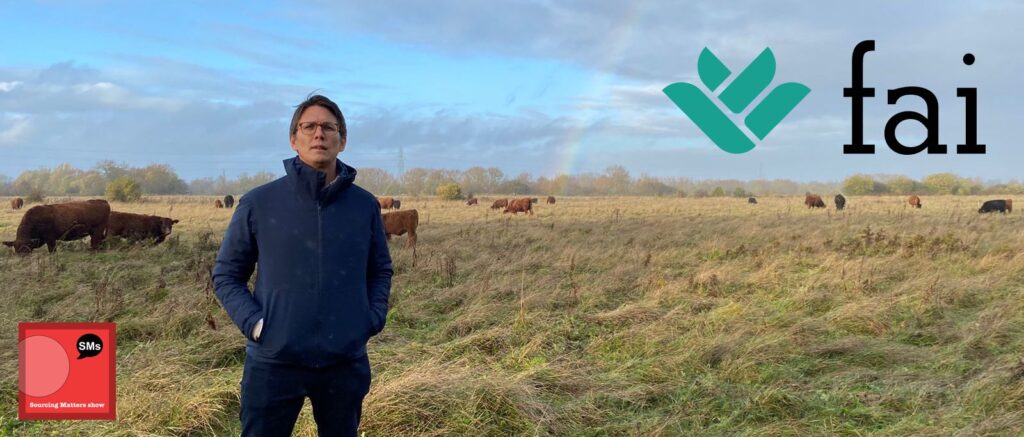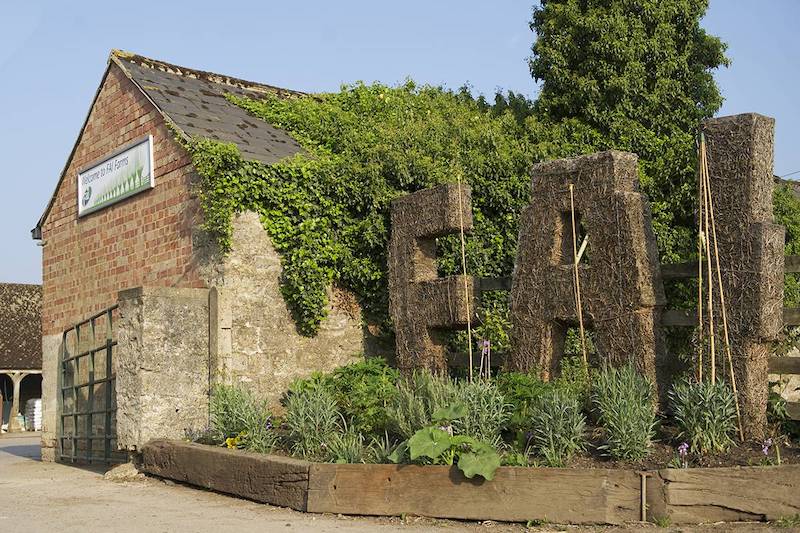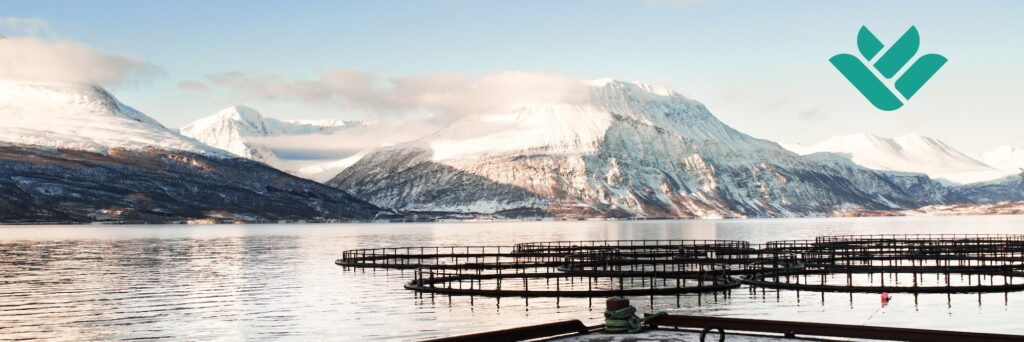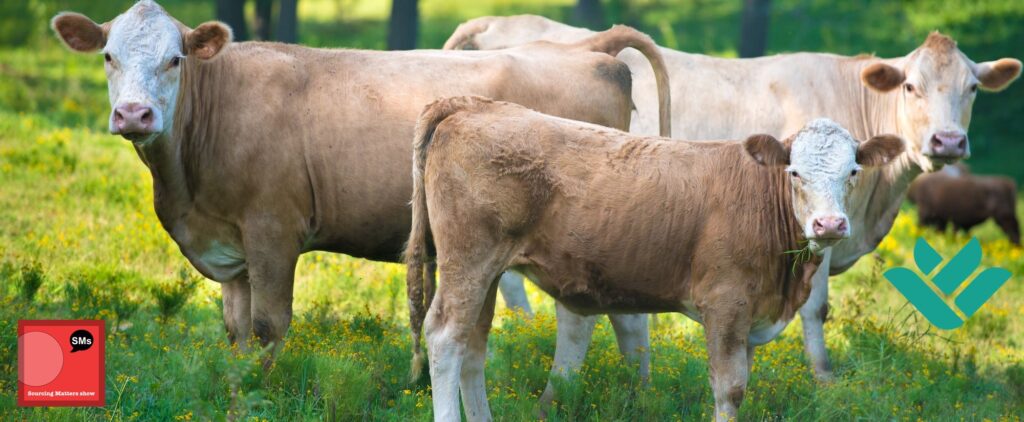– guest: Øistein Thorsen
In this series I speak with leaders fighting climate change, biodiversity loss, malnutrition and hunger through a focus on SYSTEMS CHANGE. Tune-in for a dose of optimism.
Scaling-up Meat Production Knowhow

-ft. ØISTEIN THORSEN
CEO of FAI Farms
–
.
CORE SYSTEMS CHANGE: the 6-part miniseries >>
.
ep. 107: Øistein Thorsen – CEO, FAI Farms
.

–
ep.107: ‘ANIMAL CENTRIC MEAT PRODUCTION’
Host: Aaron Niederhelman
Guest: Øistein Thorsen of FAI Farms
.
Did you know that across the globe we process 70,000,000,000 (billion) land animals every year?! That includes nine billion food animals each yr. in the U.S. alone. And yet, it’s still difficult to find good meat! That’s so out of sync with where consumer trends are headed. Why isn’t better meat more of the norm? Elevating practices to reap the benefits at market is very feasible in (better quality) meat production. In this episode we hear more from upstart leader Øistein Thorsen of FAI Farms about the opportunities there are for evolving production practice and scaling supply of better quality animal proteins.
With some tweaks and strategic investments into the well-being of the animal producing meat, fish, eggs and dairy – FAI thwarts impending supply chain concerns for big food companies while aligning with buying behaviors of contemporary consumer interests. As insurance & marketing tilth – it’s a no-brainer for these food companies with large scale needs. Investments that will benefit the eater, the producer, the environment and the planet all by improving farm animal qualify of life.
– Øistein Thorsen, CEO of FAI Farms
“Animal welfare is ground zero for food systems change.”
Based out of Oxford, U.K., for twenty years the Food Animal Initiative (FAI) has been developing systems that improve the supply chains of big food companies through investments into the well-being of the food animal. Rich in knowledge and deep in insight, they’ve honed “animal-centric” operating models for each food animal category.
As you’ll hear from Øistein, more commitments to elevate production practice in meat, dairy, farmed fish and eggs is is a tent post in repairing the broader broken food systems. And, since new growth in conventional meat and animal protein production proves more unsustainable with each passing year, the notion that this old system can manage more production load on top of the current through-put just seems irresponsible to plan around. Right?! Thorsen argues that the market opportunity for pushing the holistic view of personal well-being, planetary stability, and benevolence has a pinnacle in meat production. So, is the well-being of food animals the foundation for large scale food systems change? #Tunein to get more on that from Øistein.
.
Getting us to Animal Centric Meat Production

HOLISTIC
ANIMAL
AGRICULTURE
The reality is that people are going to eat meat in the future. A lot of it. And as new folks adopt western lifestyles, a lot more of it. In fact, experts say that 2050 demand for animal proteins will increase by 70%.
Can you imagine what 2/3s more load will do to the current impact of conventional meat? Leaders have arisen with new approaches to raise food animals and produce enough protein to meet this increased demand – while still respecting planetary boundaries, and tapping into those current POVs.
Øistein Thorsen of FAI Farms is one of these upstart pioneers that’s instigating a values-based food system through focus on improving in the health and well-being of food animals. In our conversation Thorsen explains the approach as “Animal Centric Meat Production”. He describes it this way, “to keep a shrinking planet fed and nourished for decades to come – it all begins with respecting the food animal today.”
–
Animal-Centric Food Systems in the Future
The French expression Noblesse Oblige translates to “nobility obliges”. It effectively means that with power and privilege then we’re obligated to look out for others and a shared surroundings. Thorsen tells us that a bit more respect is needed here for the animals that sustain us. To clean-up the food system, this animal-centric mantra actually taps that obligation that is seeded in us all, while also fueling actions of consumer empowerment that will help sway consumer behaviors.
Something like – knowing how we manage sentient animals that produce meat, eggs, and dairy will evolve everything about the food system – because we become more empowered eaters with a deeper connection to our food. The well-being of animals and our connection to nature is central. Animal Centric food production may be what scratches a primal itch to do better for all, including those that sustain us. We’re indebted.
Q: How much of the holistic continuum impacts your current food buying decisions?
Q: Will you evolve your behavior if you knew of the direct impact?
Q: Are you obligated?
–
–
–
As we hear from Øistein, not only is this evolution the ethical thing to do, but the reality is the resulting food products are significantly better for you and your surroundings than anything coming from conventional streams. In fact, according to Thorsen – this good meat, dairy and eggs from healthy animals living in more natural environments is better than anything coming to market – especially all this newly concocted lab-grown protein derived from processed and artificial means. We need better meat and less of it.
–
Despite all the buzz behind those plant-based / lab-grown proteins, or new noise from conventional climate-friendly propaganda – the only silver-bullet solution to big global problems like malnutrition, hunger, supply-chain disruption and even climate instability comes from doing a better job shepherding the regenerative natural resources underpinning the production of our food. So, let’s not throw the baby out with the bathwater; it’s not the cow that’s the problem, but the how we raise the cow for dairy and meat. Let’s start there. “It has mutually beneficial outcomes in which all stakeholders win,” explains Thorsen.
“I have not seen a lot of examples where something starts as a niche (elevated standard) certification and becomes mainstream.
We have the need to look at some alternative playbooks that will change the approach from the ground-up.”
Øistein Thorsen CEO of FAI Farms
A Holistic Approach to Producing Good Meat
Farm Animal Initiative (FAI) Farms was founded in 2001 at the Oxford University farm estate. 20 years later they remain a ground-breaking research and advisory firm on a mission to help the food sector overcome key challenges and implement better practices on land and at sea. Utilizing their “3E” (Economic, Environmental, Ethical) approach, FAI works with farmers and many of the world’s largest food companies to implement practical solutions for climate and food security concerns in a contemporary world.
.
.

.
The Growing Footprint of Animal Centric
A purpose driven company committed to providing solutions to climate and food security, FAI offers services led by science, data, and the practice of holistic food production. FAI’s world leading multi-disciplinary team work in partnership with major food brands to create a high welfare, equitable and regenerative food system. FAI is headquartered in Oxford, UK, with representation in the USA, Norway, Brazil, New Zealand and partners in China.
.
.
feeding the planet ✔️
employing communities ✔️
stabilizing the climate ✔️
.
.
.
next generation food production pioneer: Øistein Thorsen

As CEO of FAI, Øistein is responsible for the company’s growth and impact strategy, and new business development. He joined FAI in 2012, working with global partners including IKEA, Ferrero, McDonald’s and KFC, before leading the company through an MBO in August 2020.
Øistein grew up in shuttle between Sudan, Norway, and Ethiopia. He holds an MSc in International Political Economy from the London School of Economics (LSE) and a BA in African Studies and Development Studies from SOAS. Before joining FAI he followed in his parents’ footprints pursuing a career in international development. He worked for VSO and Oxfam, focusing on community engagement, global agricultural trade policy, and humanitarian advocacy at the United Nations.
Thorsen is the associate producer of “Black Gold”, a Sundance Film Festival feature-documentary film about coffee growers in Ethiopia’s place in the global coffee market.
Øistein lives in Brooklyn with his wife and two children.
–
–
DO YOUR PART: Stabilize the Planet by Investing in Animal Centric Agriculture
With the huge uptick in global consumption of proteins over the next few decades, current conventional practice and cutting-edge tech will only continue to send natural systems out of whack. When scaled with proper knowhow, Animal Centric agriculture food solutions can have positive and lasting impact on the planet and all of its inhabitants. We learn that when animals are put in the middle and given due respect throughout food production – it becomes the tent pole to build the new food system, to return to natural order, and to benefit each involved party. Starting with the quality of life of the food animals themselves.
–
Twitter: @FAIFarms
.
–
.
Listen-in to the full conversation with Øistein and Aaron as they discuss what it’ll take to achieve change in meat through becoming animal centric in our production.

As part of the Core Food Systems Change series, in this episode you’ll hear that when Animal Centric Agriculture becomes part of our collective consciousness it’s the best opportunity that we’ve got for a stable future.
photo credit: Melissa DiPalma & FAI Farms
.
.
the rich & lasting benefits of:
CORE SYSTEMS CHANGE – content series
The thing is… all sorts of folks will be embracing the values gained from good food and its production. Good food is simply an investment in your own personal health and performance. It’s also a venue to take real climate action in every bite, and a daily dose of benevolence for the folks that keep us well. Good food is a boom-town innovation economy that’s ripening to become invasive throughout verticals and global marketplaces. That’ll begin as more local jobs, and with regional food security.
–

–
.
.
.
.
,.




